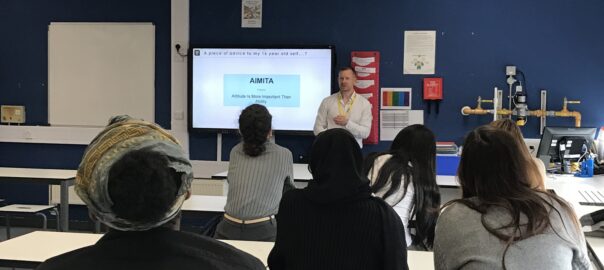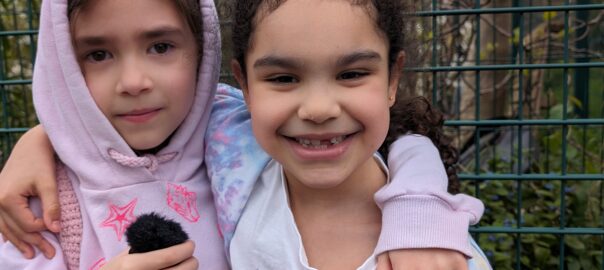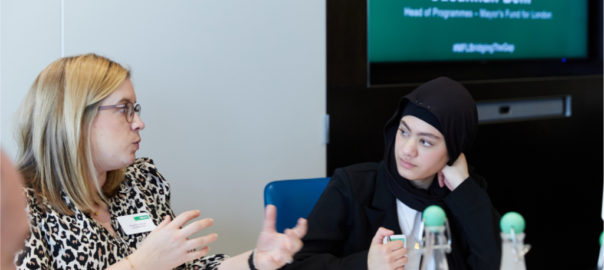Coming together: Sahra Issa and Muna Yassin

When the Mayor’s Fund for London hosted the London Food and Communities Summit in February 2024, one of the stated aims was to convene and connect those in attendance: our partners, funders, policy makers and young people. One such connection was between MFL Youth Board member and Food Summit host, Sahra Issa, and Rooted Finance CEO, Muna Yassin. Muna introduced herself to Sahra, explaining the inspiration she had felt in seeing a young Somali host and speak at the event.
Muna has over 20 years’ experience in financial inclusion services. She is the CEO of Rooted Finance (RF), a London-based specialist debt advice charity. Rooted Finance provides bespoke one-to-one support for London’s Diverse Ethnic Communities to help them manage financial distress and work towards financial wellbeing and resilience. In June 2021, Muna was recognised in the Queen’s Birthday Honours List and was awarded an MBE for charitable Financial Services to Disadvantaged People during Covid-19.
Sahra is a Year 13 student currently studying Spanish, History and Economics. She is a member of our MFL Youth Board, and has a strong drive to amplify the voices of young people and address their concerns particularly when it comes to transportation and housing.
A month on from the Food Summit, ahead of International Women’s Day, Muna and Sahra reconnected and continued their conversation from that day through an online conversation facilitated by MFL. Sharing words on the power of voice, representation and values, gender equality, the importance of financial inclusion and literacy and the Somali community.
Muna: When I saw you on the stage at the Food Summit it was a lovely surprise, and it was also such a source of inspiration for me. Obviously I do what I do and I’m in professional settings all of the time and it’s very rare that I see another Somali person and it’s very rare that I see someone so young. So to see you on there on the stage, so confident, so engaged. It was a really nice opportunity for me to think about when I was your age. It was very hard for me to have someone that I could relate to. I just had to come up to you and say hello and also express how proud I was. I think that’s a really nice way to start our conversation because it was really nice to see you at the Food Summit.
Sahra: Thank you very much. When we met at the Food Summit you mentioned your passion in improving people’s financial literacy. So, I wanted to start by asking what would you say is your favourite thing about what you’re currently doing?
M: I think I’m privileged to be working in the job that I am because it kind of hits a lot of the passions that I have. One of my passions is definitely equality. And finance sits at the heart of so many areas of people’s lives. If you can have financial equality, it means that you can set up a whole bunch of other equalities around gender and race and all of the other kinds of inequalities that people are faced with. I’ve always been interested in social justice and for me, financial freedom is a social justice issue and working with individuals who are often in really difficult circumstances and seeing their transformation is really heartening.
S: I wanted to talk to you about which women inspire you?
M: It’s really cliched, but I have to say my mother. And my Mum is an outstanding inspiration for me for two reasons. One, she’s always been an example. So, she’s worked all her life. She’s campaigned around social justice, 20/25 years ago she was one of the first people campaigning around FGM [female genital mutilation]. Really making sure that women had control and agency over their own bodies and their own lives and their own decisions. She’s also somebody who’s always encouraged her daughters to think big and to always, always, have confidence in their own beliefs. And she’s instilled that in us. I know it’s cliche, but it definitely has to be my mother.
S: I agree with all that in terms of my Mum. She came to England when she was a teenager and she’s my inspiration as well because she had to learn how to really survive in this society and [gain the] know-how of what to do. And that’s why I always listen to my mother. She has given me a sense of security and gives me advice too. She has a welcoming presence. [Sometimes] I wouldn’t know what to do until I speak to her, and that’s one thing that really inspires me about my Mum.
Did you face any difficulties in being where you are today and can you give any advice to me?
M: Just thinking about as a Somali woman, one of the areas I can’t remove, is the fact that obviously I’m Somali, but I’m also Black and I’m also Muslim, right? And there are challenges and barriers around all of those areas. One of the things that for me has always been interesting is that people don’t expect us to have opinions and I’m very opinionated. And people don’t expect us to have an idea of where we want to go in life and clear directions. They assume that men rule your lives. Being Muslim or Somali, and that effectively that there is a path that’s written for you just because of your cultural background. I’ve never subscribed to that, and I think sometimes that brings challenges amongst people who have perceptions. There’s also the trope around Black women and if you’re assertive; you’re angry. And if you’re kind of confident; you’re arrogant. So all of those things are all wrapped up in my identity. But for me, one of the things that’s always helped me is to be very clear about who I am and what I believe in and what my values are. And I think if you apply those, all of those barriers can be overcome.
S: I think within the Somali community itself, there’s a lot of division in terms of, you know, what tribes you’re from. There are so many different ‘you musts’? within the Somali community itself. And that can also place its own barriers. Within our community, it kind of stops us from excelling in different aspects of our lives. That’s something that we need to address within this community itself.
And can I ask what does gender equality mean to you?
M: Gender equality for me is around equity. So equality of opportunity, making sure that women have the same opportunities. Recognising the responsibilities, and the additional responsibilities, that women have as mothers and caregivers and having equitable solutions for ensuring that they are not penalised for those. But also thinking about equality of aspiration and how women are judged differently. So, if you’re an ambitious woman, there are negative connotations to that. If you are an assertive woman, there are negative connotations to that as well. There are cultural barriers around gender equality, and I think there is something around changing that narrative and coming back to the Somali community, that’s a really good example, right? You were talking about divisions within the Somali community, already around tribal and regional, and all of these other things, and if you are a woman who is effectively saying that doesn’t matter to me and I want to be able to work across all those different boundaries... There are then restrictions that are placed on you that you should be in your own box or whatever the case may be. So there is something around ensuring that we lift up women and we ensure that they have the bandwidth and the agency over their own lives in their own directions, that for me is the most important thing.
S: How can we break the general stereotype of women?
M: I think the more women successes that are visible, and the more that are in positions of authority and decision-making, then we are able to change some of those systemic barriers. Education is key, and obviously education always has a bias, so making sure that educators and people who are writing a curriculum or putting together what that education looks like is also from a women’s perspective. The more you have people who are in those professions and have that lived experience of women, the more that you’re able to break down those stereotypes.
S: To me, it’s around the general perception of each gender, and I feel like this can be manifested in many ways in society. Some of the ways its manifested is the economic disparity, where women can be paid less for doing the same job as a man. Furthermore, how women often are underrepresented in certain jobs – such as the political world. My stance on this is that, in order to achieve equality, there needs to be a hands-on approach from the government and holding firms accountable. We also need to uplift female voices. As well as education, a lot of countries don’t allow girls to have education whether it’s university level or a higher level and that’s something we need to rectify, not only in the UK but all over the world. That’s the only way we can achieve equality.
M: I totally agree, and I think you’ve hit the nail on the head around economics as well. Finances play such a big role, so if you want women to succeed, and if you want to be able to have control and independence over your own life, you definitely need financial freedom.
I was going to ask you, Sahra, what do you aspire to be? What are your dreams in terms of some of the things that you want to do in the future?
S: So in terms of like my trajectory and where I want to get to, I’m working towards probably doing an apprenticeship in the finance industry. I think [it] appeals to me because I see the benefits in someone understanding the financial industry and [helping others understand] banking or buying a house or how to rent and other aspects in that side of life and in finance. I would like to improve this, and I would like to give back to my family.
How does Rooted Finance helps the community?
M: We try and work in a multidimensional way. We support people in an emergency situation and financial crisis and that’s through providing debt advice. We can provide interventions, and debt solutions and then through that process of advice, we really try and work with them to understand their financial goals, their aspirations and any gaps in their financial literacy, so providing an education piece is part of that process. And recognising you can’t provide education at the point of emergency, so stabilising people’s circumstances and then starting to work with them over the long term. There are very big systemic barriers to people’s financial security and resilience. What are the things that are causing barriers to people being able to access products and services like their white counterpart populations? Why is it that people from Black and minority communities are more in debt, and are more likely to be in poverty? We’re working on a campaign over the next few years and I really want to make sure that that involves the experiences of Somali communities, Black African communities, and all Londoners, and making sure that we weave in their experiences as part of that.?
S: That’s a lot of great work and yeah, I hope to actually be a part of it.
M: Yeah, absolutely. And I think one of the things that we’re very attuned to is that obviously there’s a new generation that are growing up and who have grown up in times of austerity and then a pandemic and then a cost of living crisis. And so, a lot of our work is around understanding how we engage with young people.?
S: Hey, that is a great way to kind of wrap up kind of.
M: It’s been lovely having this chat.
S: Really lovely, thank you.
The Mayor’s Fund for London’s Youth Board is made up of young Londoners aged 16-24 from across the capital. Many have been or still are participants of our programmes, whilst others joined to represent the voices of their peers and to influence the support the charity is able to provide. We inform, consult and co-create with our Board as a whole and with individual members.



